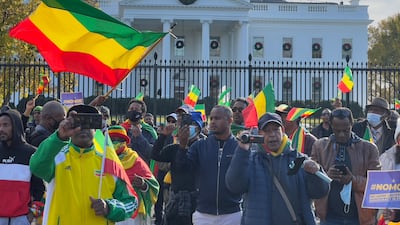President Joe Biden on Monday commended Ethiopian Prime Minister Abiy Ahmed for promising to release several high-profile political prisoners, in his first call with the country’s leader since the conflict in Tigray erupted in 2020.
Mr Abiy vowed on Friday to release several leaders from the Tigray People’s Liberation Front (TPLF) in addition to Jawar Mohammed, an Oromo activist, as Ethiopia’s majority Christian populace celebrated Orthodox Christmas.
The prime minister made the announcement in a statement calling for “national reconciliation.”
The White House noted in a readout of the call that the two leaders also “discussed ways to accelerate dialogue toward a negotiated ceasefire, the urgency of improving humanitarian access across Ethiopia and the need to address the human rights concerns of all affect Ethiopians, including concerns about detentions of Ethiopians under the state of emergency”.
Mr Abiy – the 2019 Nobel Peace Price winner – rounded up and detained several high-profile of Ethiopia’s Tigrayan community, including some US-Ethiopian dual nationals, during the TPLF’s short-lived advance on Addis Ababa last year.
Minnesota state Senator John Hoffman told The National that Mr Jawar's wife said he has been released. Mr Jawar is from the Twin Cities and was arrested in Ethiopia when protests broke out after the death of popular Oromo singer Hachalu Hundessa. Charged with terrorism, he had been on hunger strike.
A senior US official described the conversation between the two leaders as "businesslike" and "substantive".
"If could be a moment of opportunity, but only if the parties are willing to take advantage of it," the US official told reporters. "This window will not be open forever."
Mr Biden's former envoy for the Horn of Africa, Jeffrey Feltman, met with Mr Abiy last week at the prime minister's request, shortly before stepping down from the post.
Veteran diplomat David Satterfield, who completed his tenure as US ambassador to Turkey last week, is set to replace Mr Feltman as the US envoy for the region.
"The president and the prime minister did discuss Ambassador Satterfield making a trip to the region soon after he is fully on board," said the senior US official.
For his part, Mr Abiy said that he held a “candid conversation” with Mr Biden.
“We both agree there is great value in strengthening our cooperation through constructive engagement founded on mutual respect,” Mr Abiy wrote on Twitter.
The US has pushed for peace talks between Mr Abiy’s government and the TPLF, going so far as to expel Ethiopia from the African Growth and Opportunity Act, a key trade pact that provides certain countries in Africa with duty-free access to US markets.
The senior US official said "we would need to see significantly more progress" on human rights concerns in order for Ethiopia to regain access to the trade programme.
However, the Biden administration has also halted a legal review into whether Ethiopian actions in Tigray constitute genocide as part of a bid to cajole Addis Ababa into peace negotiations.
Nonetheless, the White House noted that Mr Biden also “expressed concern that the ongoing hostilities, including recent airstrikes, continue to cause civilian casualties and suffering” while “reaffirming the US commitment to work alongside the African Union and regional partners help Ethiopians peacefully resolve the conflict”.
The White House also touted “the potential to strengthen cooperation on a range of issues, and the need for concrete progress to resolve the conflict".
"We have heard some public statements from both sides that are more constructive than some of the things that have been said in the past, and we have seen at least the beginnings of some steps in a more constructive direction", the senior US official said.
Ethiopia has cut internet, phone and media access in Tigray since the conflict erupted in 2020 while reportedly complicating or halting the delivery of humanitarian aid to the war-torn region.
Witnesses have described widespread human rights abuses in Tigray, including the displacement and murder of civilians, gang rapes, the destruction of civilian infrastructure and the burning of crops.


